China’s burgeoning relationship with Africa, often touted as a mutually beneficial partnership, is increasingly facing scrutiny. A recent flashpoint is the alleged “two-track” system in Chinese education, leaving African students feeling marginalized and facing unequal treatment.
This “two-track” system, though not officially acknowledged, is apparent in the stark differences in resources and opportunities available to Chinese and international students. While Chinese students enjoy top-tier facilities, access to scholarships, and preferential treatment in research, African students often find themselves relegated to second-class status. They face overcrowded classrooms, limited access to research labs, and lack of funding and guidance.
This disparity is exacerbated by language barriers and cultural differences, leaving many African students feeling isolated and struggling to keep up. The unequal treatment creates a sense of disillusionment and frustration, casting a shadow over China’s promise of a “win-win” partnership.
This systemic bias not only undermines the educational experience for African students but also raises concerns about China’s commitment to genuine partnership. While economic cooperation is crucial, fostering equality and opportunity for all students within China’s educational system is vital for building a truly sustainable and mutually beneficial relationship with Africa.
Addressing this “two-track” system requires transparent dialogue, concrete action, and a commitment to equal opportunities for all. Only then can China truly live up to its promise of a shared future for all and build a truly equitable and collaborative partnership with Africa.





